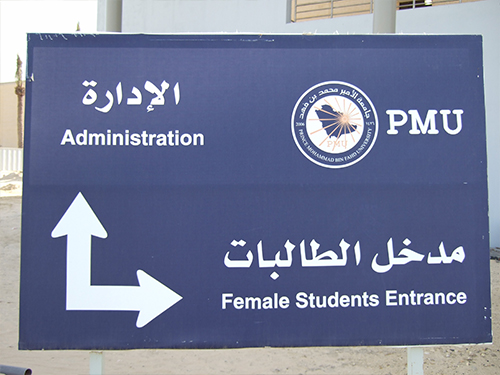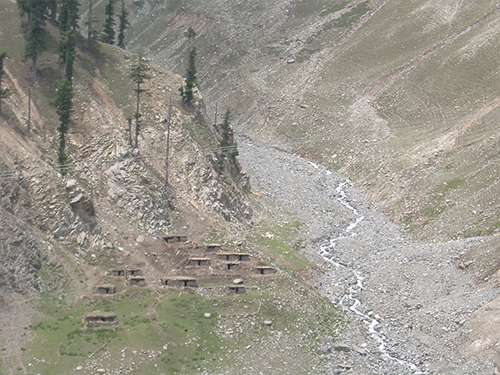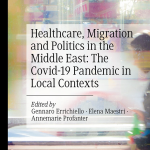Call for papers 2026: Cultural Exchange and Human Development in the 21st Century: Navigating East-West relations
2026/2/5
This workshop explores the role of cultural exchange in shaping human development and East–West relations through postcolonial and decolonial lenses. It examines how historical power asymmetries continue to shape knowledge production, identity, and development trajectories.
The focus is on local agency, social change, and emerging realities related to migration, labour, gender, education, and sustainability.
We invite contributions on, but not limited to:
- Cultural diversity, migration, and urban governance: mobility, belonging, and identity.
- Education, knowledge production, and labour markets: whose knowledge is valued, roles of nationals, women, and foreign workers.
- Environmental sustainability and the green economy: climate response, food security, and policy.
- Political culture and post-conflict reconstruction: mediation, peacebuilding, and regional agency.
The workshop provides a platform for interdisciplinary dialogue on how cultural, social, and political dynamics shape development, knowledge, and identity globally.
Healthcare, Migration and Politics in the Middle East: The Covid-19 Pandemic in Local Contexts, 2026
2026/2/5
This book discusses the impact of international migrants and refugees in the Middle East in the context of the Covid-19 pandemic, focusing on 3 main questions: What has the role of international migrants been in coping with Covid-19? How has this international health crisis affected international migrants and refugees? How has it affected socio-economic and political structures? The authors assess the relationship between healthcare, international migration and the pandemic through specific case-studies including: Türkiye, with reference to the case of Uzbek and Georgian migrant women, Türkiye with reference to Turkish citizens’ attitudes towards Syrian refugees, Palestinian camps in Lebanon, Saudi Arabia and students’ and immigrant professors’ ethnographic experiences, the Arab Gulf countries and the Pakistan Medical Centre in Dubai, Arabia and the case-study of Oman, and Iran. The argument seeks to move beyond the idea of migrants as victims of the pandemic, and sheds light on the active role and agency of migrants to underline their substantive contribution to coping with the health crisis.
https://link.springer.com/book/9783032037602
Migration and Integration Challenges of Muslim Immigrants in Europe Debating Policies and Cultural Approaches
2023/7/24
As the impetus of globalization continues to gather pace, more and more people leave their homes pursuing dreams of a better life for themselves and their families. Muslim immigrants converging on Europe from widely divergent communities scattered throughout North Africa, the Middle East and South-East Asia, represent a great variety of local cultures and traditions. Trans-Mediterranean networks form the basis of migration routes and are key factors in the destinations of these migrants and in the overall process of immigration, be this towards Europe or other Muslim countries. South-North fluxes intertwine with South-South fluxes, among which the Gulf Arab countries stand out as a prime destination, not only for low-skilled labour. Different situations emerge, within a variegated discourse on co-existence, integration, assimilation and the preservation of identity. The adoption of this transnational dimension incorporating both destination, and points of origin, enables the investigation of migration to move beyond a purely Eurocentric approach. Thus, different national patterns are analyzed with a focus on a number of significant case-studies. By debating policies and cultural approaches the aim is to add innovative scholarship to the challenge of integration. Cross-cultural pluralism on the part of the nation states comprising the European Union is one avenue for moving the dialogue between different cultural frameworks towards a more compatible form.
https://link.springer.com/book/10.1007/978-3-030-75626-0
Call for papers 2023: Mapping and debating migration and the Covid-19 pandemic in the MENA region
2023/7/24
This workshop aims at debating, in a comparative and interdisciplinary perspective, the impact of the Covid-19 pandemic on the MENA region, and in particular on the healthcare and education systems. In some of these countries, and most notably in the GCC countries, these systems have historically and recently functioned because of the presence of foreigners too. We want to map and debate the role of migrants in the healthcare as well as in the education sectors, which have seen the presence of migrants and NGOs operating in these countries. The workshop intends to propose a discussion and debate around the role of migrants in providing healthcare services and education in light of the imposed restrictions during the Covid-19 pandemic. By adopting an interdisciplinary and comparative approach, the workshop intends to focus on the historical, socioeconomic, political and cultural dynamics in order to better understand the role of migrants in healthcare and education sectors, and their interaction with the nationals.
The workshop revolves around three major themes:
- The impact of Covid-19 on the migration dynamics within the MENA region;
- International cooperation initiatives aimed at supporting migrants and refugees in the MENA region;
- The initiatives organised by the migrant communities in MENA region to face the Covid-19 pandemic and its consequences.
Call for papers 2023: Seventh Forum Young Graduates in South Tyrol – Siebtes Forum für Jungakademiker/-innen in Südtirol – Settimo Forum per Neolaureati in Alto Adige
2023/7/24
In 2007 I initiated the “Forum for Young Graduates in South Tyrol”. In an effort to promote an ongoing interdisciplinary and intercultural scientific dialogue, I have invited young graduates of diverse disciplines in 2023 for the seventh time to tackle the task of intensive investigation into “cultures in dialogue” as it relates to issues of international as well as regional relevance. The descriptive aim of the forum is to provide an overview of diverse aspects of the phenomenon of a multicultural society in South Tyrol. The constructive aspect of this endeavor it to pursue the following goal: To create moments of encounter, of intersubjective as well as interdisciplinary dialogue and lay the basis for a theoretical foundation of practical forms of dialogic problem analysis and problem solving. In an attempt to motivate dialogue across language barriers, a screening panel of international experts of diverse disciplines chose five contributions.
A price of 1,000 Euros will allow the graduate/post-graduate presenting the most meaningful and promising scientific contribution to publish it in the international publishing house “Peter Lang”. With the Forum for Young Graduates as a biennial event I also aim to institutionalize my collaboration with Young Scholars: It allows us to mingle the respective strengths, be it from the practical applicative approach to questions of integration and intercultural issues to the theoretical analysis of those issues from a research oriented perspective. The collaborative effort of participants at the forum 2007 gave birth to a book project entitled “Cultures in Dialogue”. This is the first of a series: We will be working on the 2023 edition of “Cultures in Dialogue” with contributors who will be members or presenters in this years conference. In order to continue the discussion of those interdisciplinary themes, you are invited to contribute to this by joining the online forum: make suggestions, hand in contributions, simply get involved!
Moreover, in order to foster the ongoing debate, presenters at the forum, members of the screening panel, as well as other experts in the field, students and everybody who aims to get involved who are interested in joining the online forum – just follow the link and share your ideas, thoughts, and opinions.
Abstract and short cv using the template below should be e-mailed to:
Prof. Dr. Dr. Mag. MSc Annemarie Profanter
Libera Università di Bolzano – Freie Universität Bozen
Facoltà di Scienze della Formazione – Fakultät für Bildungswissenschaften
Viale Ratisbona 16 – Regensburger Allee 16
39042 Bressanone – Brixen
Italy
Tel.: +39 0472/014 141
Fax: +39 0472/014 009
mailto: annemarie.profanter@unibz.it
Badanti – Pflegen in der Fremde/ Badanti – Assistere in terra straniera
2014/5/21
Buchvorstellung des Buches „Badanti – Pflegen in der Fremde“ / „Badanti – assistere in terra straniera“ mit Diskussion und Präsentation des Kurzfilms „Die Badante“Presentazione del libro „Badanti – Pflegen in der Fremde“ / „Badanti – assistere in terra straniera“ con discussione e presentazione del cortometraggio “La Badante”
Freitag | venerdì, 30.09.2016 – ore 20.00 Uhr in/a Proveis
Referantinnen:
Barbara Bogoni
Frauenvereinigung DONNE NISSA’ Associazione
Annemarie Profanter
Professorin an der Fakultät für BIWI, unibz / Professoressa alla Facoltà di Scienze della Formazione, unibz
Organisation:
Karin Valorz
A New Dawn for Women in Higher Education in Saudi Arabia: Looming Changes on the Horizon?
2014/5/20
In explicating my extraordinary experiences in this multi-faceted place the focus is on the eastern region of the Kingdom of Saudi Arabia and centers around the contacts and relationships built through my employ as educator for the women’s campus of the first “co-educational”, “high tech”, private university delivering its curriculum in English, Prince Mohammed bin Fahd University (PMU). (mehr …)
Polygyny in Oman
2011/5/19
The film “Polygyny in Oman: Forms and Changes of this societal and cultural marital arrangement” was being shot in the Sultanate of Oman in February/March of 2011.
The intent behind the film was to offer a glimpse into daily life in the Sultanate for those people living in polygynous marriages or families in order to allow people to see the similarities amongst all forms of families presented and also to demystify what in the West is an uncommon marital form. This film addresses this lack by explaining in intimate and vulnerable language some of the divergent cultural practices which can antagonize and alienate European neighbors and colleagues.
In collaboration with American Research Fellow Stephanie Ryan Cate from the University of Alabama Huntsville (USA) and a filmmaker Ms. Arda Nederveen, Visuele Producties, Netherlands, I realized a film trip to Oman from the 26th of February to the 12th of March 2010 building on the connection established during my work as professor at Dhofar University in 2006. The intimacy afforded by being in their homes and spaces allowed a greater openness to the questions regarding their daily lives and lifestyles. (mehr …)
In memory of Prof. Otto Schober (died in January 2010)
2010/1/16
From the corner of my eye I saw Prof. Schober who, surrounded by a ton of student essays, was still there marking papers. It was pitch dark. He looked desperate, and I said: „Hey Prof. Schober are you all right?“ He sighed and said: „If you only knew Dr. Profanter, if you only knew.“ I thought, at first, he was losing it over students‘ work; then I realized that he was in fact pale like a ghost, had lost at least 10 pounds and was just a shadow of himself. Well, I stopped and gave him a chance to come close and open his heart. The fact that he held my finger tightly (that I had jammed in the door in Rome) while telling me his story was at first overshadowed by my physical pain, but shortly after, nothing compared to the human suffering Prof. Schober shared with me. He was in deep shock over the sudden cerebral hemorrhage his son had suffered a couple of weeks ago…blood everywhere…intensive care…a vision of spending Christmas beside his bed in the hospital…, horrible really horrible images. Prof. Schober just stood there, stunned by the injustice of life. (mehr …)
In memory of Abdullah Baqweer
2008/10/30
(mehr …)

























